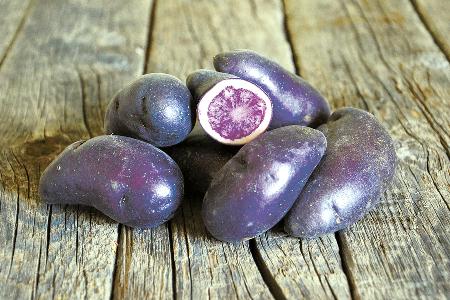New Potato Varieties

New Potato Varieties
Before you finalize next year's vegetable garden, check out these unusual varieties of potatoes.
Phil Bakker, at EarthApples in Stony Plain, Alberta, moved there from the Netherlands. He has been raising European variety seed potatoes in western Canada for 25 years. The focus has been on wholesale commercial markets. But individuals kept contacting the company and expressed interest in buying seed potatoes.
Currently 10 varieties that grow well in cold climates are available. That list will grow as new varieties are tested. They are non-GMO, certified seed, and they cover the spectrum of color - white, yellow, purple and red. In their online descriptions, EarthApples includes information about the best way to prepare them.
"Different varieties have nuances," Bakker explains. "For example, Lady Amarilla produces good french fries. It's one of the varieties used in Belgium for their famous fries."
EarthApples specialty varieties include baby potatoes such as the early harvest yellow Jazzy, and Rosemarie, a pinkish fingerling-type potato. Others include Little Giant, Cerisa, and Gemson.
The non-typical potatoes appeal to urban container gardeners and to long-time gardeners who want to grow something new alongside traditional favorites. As a bonus, they learn new techniques.
For example, to reduce growing time as much as 3 weeks, Bakker suggests chitting - a European technique. Seed potatoes are left in natural light indoors for a couple of weeks before planting. Instead of growing long sprouts like potatoes kept in the dark, they grow short sprouts that turn green and begin to develop minuscule leaves. With more energy in the seed potato, the plants poke through the ground sooner. Another benefit of chitting is that the earlier the potato is ready for harvest, the less likely it is to be affected by blight, which tends to occur later in the season.
Because the seed potatoes are grown in Canada they have northern vigor. They mature faster, which is good for shorter growing seasons. But they also have less disease and stress issues in warmer climates, such as California.
The EarthApples website lists the available varieties and will take orders from customers in Canada and the U.S. Shipments go out beginning in late March/early April.
"This is a great challenge to present new varieties in a fun way and to think outside of the box," Bakker says.
